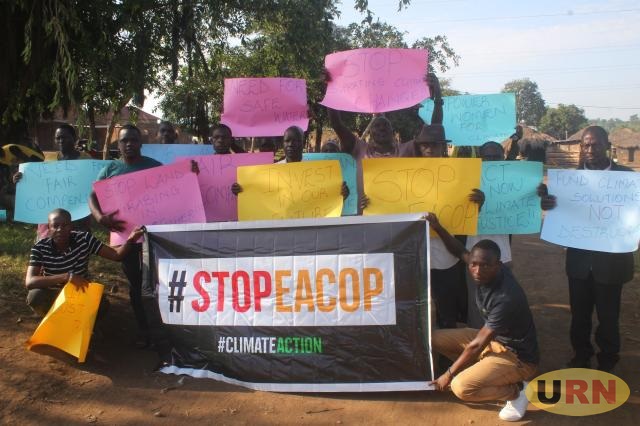
Kikuube, Uganda | THE INDEPENDENT | Residents of Kikuube have protested against Daqing Oilfield Construction Group Limited, a company that was subcontracted by CNOOC Uganda to undertake the construction of the crucial feeder pipeline from the Kingfisher Oilfield to the export delivery point. The company is accused of allegedly being behind the massive destruction of the environment as they execute their work.
The Kingfisher Feeder Line project starts from the Central Processing Facility-CPF of Kingfisher Oilfield and ends at the export oil delivery point.
However, the project-affected persons and those settling adjacent to the feeder pipeline say the company has not adhered to the set environmental guidelines and standards.
Some of the members from the affected areas held placards as they matched through the streets of Kikuube towards the offices of Daqing Oilfield Construction Group Limited in Hohwa village along the Hohwa-Kyarushesha-Kyangwali- Buhuka road in Kabwoya sub-county.
The placards read; “Stop EACOP”, “Find climate solution not destruction”, “Respect our rights”, Need for safe water, and Invest in our future among others.
They argue that the destruction of nature that is critical during this time when the Albertine region and the country will be undergoing the production phase of the oil and gas is criminal and should be highly condemned.
They added that the company has negatively impacted the environment by encroaching and degrading the wetlands, swamps, and water sources and also cutting down trees to pave the way for the construction of the pipeline that they have not replaced.
Adriko Sostine Leti, a resident of Kaseeta village in Kabwoya sub-county says, the company has cut down trees that used to attract rainfall in the area but has not replaced any.
This he says, has resulted in a shortage of rainfall with the area receiving almost no rainfall for the past year. He wants the government to prevail over the company so that it can protect nature.
Julius Tumwine, a resident of Rwengabi says, that since the company embarked on the construction of the feeder pipeline, the area started experiencing adverse climate change following the destruction of swamps, wetlands, water sources, and cutting down of indigenous trees.
Kamiat Bingi, a resident of Ndongo village explains that women in the area trek a long distance in search of clean drinking water since most of the water sources in the area have been blocked and destroyed by the construction of the oil pipeline.
Bridget Nabwire, from Green Foster Action Foundation-GREFA, wants the entire EACOP project halted for the oil companies to first address the emerging issues affecting the project-affected persons and the neighboring communities stating that residents are exposed to environmental hazards.
She says, while the project may bring short-term economic benefits such as the creation of jobs and infrastructure development, they are often outweighed by the long-term environmental and social costs.
Abdul Aziz Bweete, a researcher from Kyambogo University says, the company should re-evaluate and conduct a comprehensive reassessment of the Kingfisher project’s environmental and social impacts with a particular focus on its contribution to climate change.
He says the risk of oil spills and other environmental hazards poses a severe threat to the ecosystems endangering wildlife and communities who depend on the natural environment for their livelihoods.
An official at Daqing Oilfield Construction Group Limited who spoke to URN on condition of anonymity, because he is not authorized to speak for the company, stated that they are doing everything possible to ensure that they execute their work in an environmentally friendly manner.
He says the protection and conservation of nature is crucial in their operations adding that they will plant and replace all the trees cut down in the process of clearing the bush to pave the way for the construction of the pipeline.
The 1,443km crude oil export pipeline will transport Uganda’s crude oil from Hoima in Uganda to the Chongoleani peninsula near Tanga Port in Tanzania.
It is envisaged to be the longest electrically heated pipeline in the world and will cross through 10 districts in Uganda, a distance of 296 kilometers, and 25 districts in Tanzania, covering eight regions and 25 districts.
The government rolled out the program of acquiring land for the project in August 2018.
According to the agreed plan, the pipeline route will begin from Hoima through Kikuube, Kakumiro, Kyankwanzi, Mubende, Gomba, Sembabule, Lwengo, Kyotera, and Rakai, and cross the Tanzania border between Masaka and Bukoba, and traverse Tanzania through Kahama, Singida, Kondoa, into Tanga.
In 2022, the EU Parliament passed a resolution to stay the East African Crude Oil Pipeline (EACOP) for a year.
The EU Parliament then wanted the entire EACOP project delayed citing alleged gross human rights violations and environmental concerns.
The European Parliament resolution adopted raised concern over human rights violations in Uganda and Tanzania linked to investments in the oil and gas sector.
The EU Parliament zeroed in on the wrongful imprisonment of human rights defenders, the arbitrary suspension of NGOs, arbitrary prison sentences, and the eviction of hundreds of people from their land without fair and adequate compensation.
According to the EU Parliament, more than 100,000 people were at risk of being displaced by the EACOP project, and demanded for them to be adequately compensated.
The EU Parliament was also tasked to put to an end the extractive activities in the protected and sensitive ecosystems including the shores of Lake Albert citing the 132 wells that Total Energies plans to dig into the Murchison Falls which is a protected area National Park and to other protected areas where the heated EACOP pipeline will go through.
*****
URN
 The Independent Uganda: You get the Truth we Pay the Price
The Independent Uganda: You get the Truth we Pay the Price





